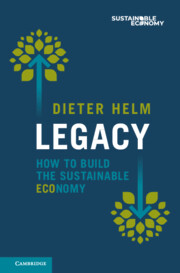Book contents
- Legacy
- Legacy
- Copyright page
- Dedication
- Epigraph
- Contents
- Preface
- Acknowledgements
- Abbreviations
- 1 Introduction
- 2 The Next Generation
- 3 Taking Precautions, Building Resilience
- 4 The Capitals
- 5 Sustainable Accounting and the Balance Sheet
- 6 Polluter Pays
- 7 Public Goods and Zero Marginal Costs
- 8 Sustainable Consumption, Deficits and Debt
- 9 Social Justice
- 10 Delivering the System Plans
- 11 A New Constitution
- 12 Conclusions: It Could Go Either Way
- Websites
- Bibliography
- Index
Index
Published online by Cambridge University Press: 19 October 2023
- Legacy
- Legacy
- Copyright page
- Dedication
- Epigraph
- Contents
- Preface
- Acknowledgements
- Abbreviations
- 1 Introduction
- 2 The Next Generation
- 3 Taking Precautions, Building Resilience
- 4 The Capitals
- 5 Sustainable Accounting and the Balance Sheet
- 6 Polluter Pays
- 7 Public Goods and Zero Marginal Costs
- 8 Sustainable Consumption, Deficits and Debt
- 9 Social Justice
- 10 Delivering the System Plans
- 11 A New Constitution
- 12 Conclusions: It Could Go Either Way
- Websites
- Bibliography
- Index
Summary
- Type
- Chapter
- Information
- LegacyHow to Build the Sustainable Economy, pp. 241 - 249Publisher: Cambridge University PressPrint publication year: 2023
- Creative Commons
- This content is Open Access and distributed under the terms of the Creative Commons Attribution licence CC-BY-NC-ND 4.0 https://creativecommons.org/cclicenses/

